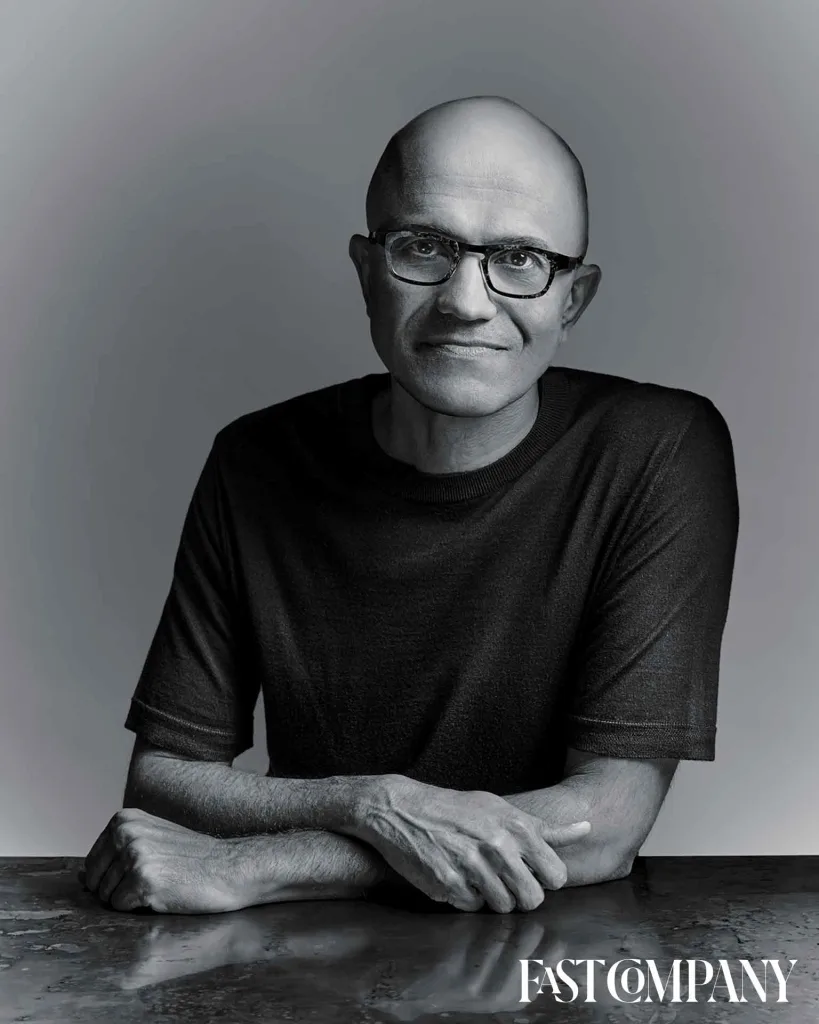This story is part of a special series celebrating the 10th anniversary of the Fast Company Innovation Festival.
Ask Microsoft CEO Satya Nadella about his approach to innovation, and he tends to reminisce. He’ll name-check Skype Translator, the real-time language-translation tool he unveiled soon after being tapped to run Microsoft in 2014—a crucial early sign of his commitment to AI leadership, as he sees it. Or he’ll turn way back to what it was like to join the company in 1992, as computer networks were just taking off—still one of the industry’s most epoch-shifting moments.
In other words, according to Nadella, what seem to be inflection points are usually the result of years of patient investment. “You can’t say, ‘Oh, ChatGPT just launched—it’s time to take [AI] seriously,’ ” he says. “That’s too late.” But his remarkable run at the software behemoth, which has seen its market cap go up more than tenfold in his time as CEO, reflects his ability to focus on new possibilities rather than past glories.
Instead of relying solely on Microsoft’s own long-standing AI research efforts, he made a prescient investment in OpenAI in 2019, getting first dibs on the same groundbreaking technology that powers ChatGPT. This year, he forged a deal with French AI startup Mistral AI, a rising competitor to OpenAI and Google known for its open-source AI. He also pulled off a hiring coup when Google DeepMind cofounder Mustafa Suleyman agreed to head a new Microsoft consumer AI group.
Along the way, Nadella has resisted the temptation to tamper with key Microsoft acquisitions such as LinkedIn and GitHub. Instead, he’s allowed them to bloom on their own terms, making them far more valuable than if he’d remolded them to be more obviously Microsoftian.

Nadella’s first decade as CEO has not been without some disappointments—the HoloLens augmented reality headset made a splash then didn’t go anywhere, and he has expressed regret that Microsoft exited the smartphone business in 2016. Still, Nadella’s leadership has been guided by his belief that computing will become only more ubiquitous and that Microsoft should spread its bets broadly, learning as it goes. Some initiatives “have worked better than I expected, and some are taking longer than I expected,” he says. “But I’m always coming back to those core principles.”
Ak chcete pridať komentár, prihláste sa
Ostatné príspevky v tejto skupine

For months, a group of Hood County, Texas, residents has been pushing to create a new town of their own. The effort began in March, when citizens living in a 2-square-mile unincorporated stretch o

President Donald Trump is calling

Last year, Transport for London tested AI-powered CCTV at Willesden Gr

Although AI is changing the media, how much it’s

While tech and AI giants guard their knowledge graphs behind proprieta

Every company wants to have an AI strategy: A bold vision to do more w

The global race for better batteries has never been more intense. Electric vehicles, drones, and next-generation aircraft all depend on high-performance energy storage—yet the traditiona
